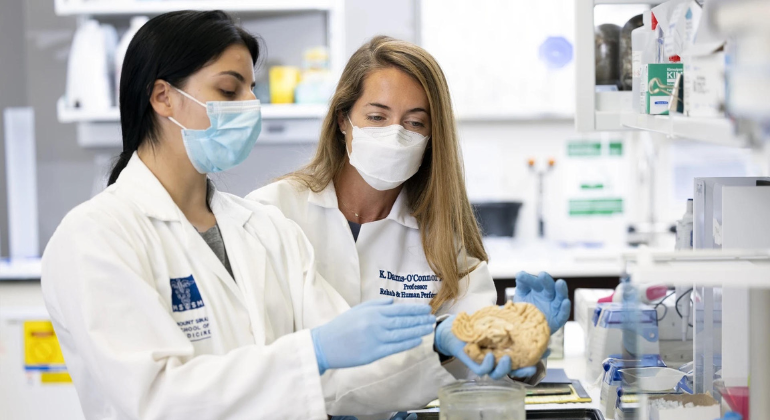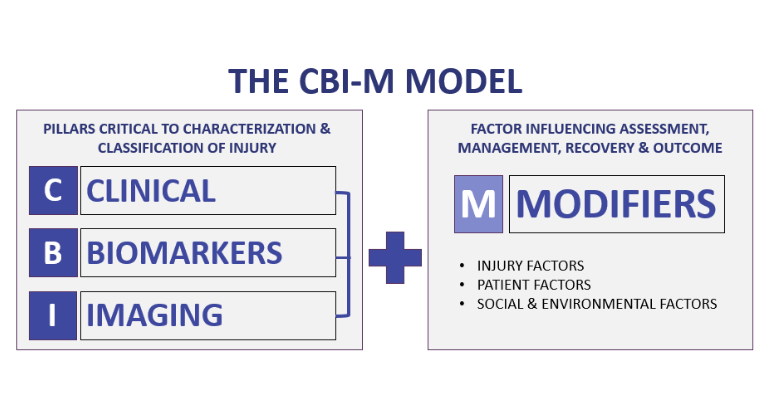New Research on the Effects of Traumatic Brain Injury (TBI)
Mount Sinai researchers publish studies on improving interventions and outcomes of TBI published in NeuroRehabilitation journal.
Considerable opportunity exists to improve interventions and outcomes of traumatic brain injury (TBI) in older adults, according to three studies published in the recent online issue of NeuroRehabilitation by researchers from the Icahn School of Medicine at Mount Sinai.
- An Exploration of Clinical Dementia Phenotypes Among Individuals With and Without Traumatic Brain Injury
Some evidence suggests that a history of TBI is associated with an increased risk of dementia later in life, but the clinical features of dementia associated with TBI have not been well investigated. Researchers at the Icahn School of Medicine as well as other institutions analyzed data from elderly individuals with dementia with and without a history of TBI to characterize the clinical profiles of patients with post-TBI dementia.
The results of the study indicate that compared to older adults with dementia with no history of TBI, those with a history of TBI had higher fluency and verbal memory scores and later onset of decline. However, their general health was worse, they were more likely to have received medical attention for depression, and were more likely to have a gait disorder, falls, and motor slowness. These findings suggest that dementia among individuals with a history of TBI may represent a unique clinical phenotype that is distinct from that seen among elderly individuals who develop dementia without a history of TBI.
"Our study indicates that individuals with dementia and without a history of TBI may present clinical characteristics that differ in subtle but meaningful ways," said Kristen Dams-O'Connor, PhD, first author of the study and an Assistant Professor of Rehabilitation Medicine at the Icahn School of Medicine at Mount Sinai. "It is imperative that clinicians take a history of TBI into account when making dementia diagnoses."
For this study, researchers used data from the National Alzheimer's Coordinating Center (NACC) Uniform Data Set (UDS) collected between September 2005 and May 2012 to analyze 332 elderly individuals with dementia and a history of TBI and 664 elderly individuals without dementia who do have a history of TBI. Statistical analyses focused on evaluating differences in the areas of neurocognitive functioning, psychiatric functioning, medical history and health, clinical characteristics of dementia, and dementia diagnosis using data collected at the baseline (first) NACC study visit.
- Mortality of Elderly Individuals with TBI in the First 5 Years Following Injury
After observing a high rate of mortality among patients over the age of 55 in the first five years after sustaining a TBI, researchers at the Icahn School of Medicine at Mount Sinai were interested in learning more about the precise causes for what may be considered a premature death.
The results of this study indicate that for approximately a third of the patients, death one to five years after TBI resulted from health conditions that were present at the time of injury before the onset of TBI, suggesting a continuation of an already ongoing process. The remainder of patients died from conditions that appeared to unfold in the years after injury. According to the authors, each cause of death in this sample would have required pro-active medical management, medical intervention and medication compliance.
"Like those with other chronic health conditions, individuals with TBI could benefit from the development of a disease management model of primary care," said one of the study authors, Wayne Gordon, PhD, Jack Nash Professor and Vice Chair of the Department of Rehabilitation Medicine at the Icahn School of Medicine at Mount Sinai and Chief of the Rehabilitation Psychology and Neuropsychology service. "This study suggests that close medical management and lifestyle interventions may help to prevent premature death among elderly survivors of TBI in the future."
Researchers reviewed the charts of 30 individuals over the age of 55 who completed inpatient acute rehabilitation during the period from 2003-2009 and who died one to four years after TBI, and then compared that data to a matched sample of 30 patients who did not die. They found that 53 percent of deceased subjects had been diagnosed with gait abnormalities, 32 percent were taking respiratory medications at admission, and 17 percent were taking respiratory medications at discharge. Compared to patients who survived several years after injury, deceased patients were discharged from the hospital with significantly more medications.
- Inpatient Rehabilitation for Traumatic Brain Injury: The Influence of Age on Treatments and Outcomes
For this study, researchers analyzed the difference in treatment and outcomes between elderly and younger patients with TBI. They found that patients over 65 had lower brain injury severity and a shorter length of stay in acute care. Elderly patients also received fewer hours of rehabilitation therapy, due to a shorter length of stay, and fewer hours of treatment per day, especially from psychology and therapeutic recreation. They gained less functional ability during and after rehabilitation, and had a very high mortality rate.
"We know significantly more about the treatment received by adolescents and young adults with TBI than we do about those over 65," said Marcel Dijkers, PhD, lead author and Research Professor in the Department of Rehabilitation Medicine at Mount Sinai. "Our data indicates that elderly people can be rehabilitated successfully, but it raises a number of questions. For instance: is the high mortality due to the TBI or is it the result of the continuation of a condition that began pre-TBI?"
The researchers analyzed data on 1,419 patients with TBI admitted to nine TBI rehabilitation inpatient programs across the country between 2009 and 2011. They collected data through abstracting of medical records, point-of-care forms completed by therapists, and interviews conducted three and nine months after discharge.
About The Brain Injury Research Center of Mount Sinai (BIRC-MS)
The Brain Injury Research Center of Mount Sinai (BIRC-MS) has a primary focus on conducting research addressing the challenges of traumatic brain injury, or TBI. Recent research has focused on testing the effectiveness of treatment interventions on the cognitive, emotional and behavioral functioning of people with brain injuries. The center is also involved in several activities aimed at better identifying people with "hidden" brain injuries–where people have disabilities due to a brain injury, but are unaware of the causal link between an injury to the brain they have experienced and current problems in daily life. A major part of BIRC-MS activity is sharing research results with others through outreach to the field, sharing information with people with disabilities and their families, training future researchers and taking actions to affect policy.
To learn more, visit http://icahn.mssm.edu/research/centers/brain-injury-research-center-of-mount-sinai
About The Mount Sinai Medical Center
The Mount Sinai Medical Center encompasses both The Mount Sinai Hospital and Icahn School of Medicine at Mount Sinai. Established in 1968, the Icahn School of Medicine at Mount Sinai is one of the leading medical schools in the United States. The Icahn School of Medicine is noted for innovation in education, biomedical research, clinical care delivery, and local and global community service. It has more than 3,400 faculty members in 32 departments and 14 research institutes, and ranks among the top 20 medical schools both in National Institutes of Health (NIH) funding and by U.S. News & World Report.
The Mount Sinai Hospital, founded in 1852, is a 1,171-bed tertiary- and quaternary-care teaching facility and one of the nation's oldest, largest and most-respected voluntary hospitals. In 2012, U.S. News & World Report ranked The Mount Sinai Hospital 14th on its elite Honor Roll of the nation's top hospitals based on reputation, safety, and other patient-care factors. Mount Sinai is one of just 12 integrated academic medical centers whose medical school ranks among the top 20 in NIH funding and by U.S. News & World Report and whose hospital is on the U.S. News & World Report Honor Roll. Nearly 60,000 people were treated at Mount Sinai as inpatients last year, and approximately 560,000 outpatient visits took place.
For more information, visit http://www.mountsinai.org.
Find Mount Sinai on:
Facebook: http://www.facebook.com/mountsinainyc
Twitter @mountsinainyc
YouTube: http://www.youtube.com/mountsinainy
# # #
About the Mount Sinai Health System
Mount Sinai Health System is one of the largest academic medical systems in the New York metro area, with 48,000 employees working across seven hospitals, more than 400 outpatient practices, more than 600 research and clinical labs, a school of nursing, and a leading school of medicine and graduate education. Mount Sinai advances health for all people, everywhere, by taking on the most complex health care challenges of our time—discovering and applying new scientific learning and knowledge; developing safer, more effective treatments; educating the next generation of medical leaders and innovators; and supporting local communities by delivering high-quality care to all who need it.
Through the integration of its hospitals, labs, and schools, Mount Sinai offers comprehensive health care solutions from birth through geriatrics, leveraging innovative approaches such as artificial intelligence and informatics while keeping patients’ medical and emotional needs at the center of all treatment. The Health System includes approximately 9,000 primary and specialty care physicians and 10 free-standing joint-venture centers throughout the five boroughs of New York City, Westchester, Long Island, and Florida. Hospitals within the System are consistently ranked by Newsweek’s® “The World’s Best Smart Hospitals, Best in State Hospitals, World Best Hospitals and Best Specialty Hospitals” and by U.S. News & World Report's® “Best Hospitals” and “Best Children’s Hospitals.” The Mount Sinai Hospital is on the U.S. News & World Report® “Best Hospitals” Honor Roll for 2025-2026.
For more information, visit https://www.mountsinai.org or find Mount Sinai on Facebook, Instagram, LinkedIn, X, and YouTube.

The New England Journal of Medicine Shines Spotlight on Forensic Pathology
Jul 03, 2025 View All Press Releases



